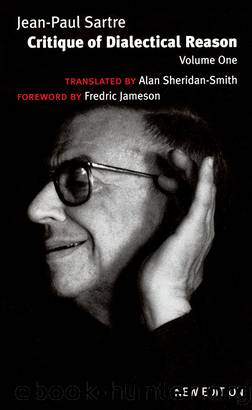Critique of Dialectical Reason, Volume 1 by Jean-Paul Sartre

Author:Jean-Paul Sartre [Sartre, Jean-Paul]
Language: eng
Format: epub
Publisher: Verso
2 Reciprocity and Active Passivity
We have now grasped, for the first time, the complex relation between the practical organism and labour, and the common individual as function. But this investigation teaches us that the efficacity of the common individual, as an integrated member of the group, entirely depends on the mediating moment of organic praxis, even if this praxis in itself makes use of common instruments and reveals, through them, the common field defined by the group. This means that organisation is a real operation which the group performs on itself as a distribution of tasks in accordance with the common praxis. The common praxis, on the other hand, is the mutual or successive conditioning of functions in so far as a multiplicity of individual actions concretely inscribes them in a definite situation. The only direct and specific action of the organised group, therefore, is its organisation and perpetual reorganisation, in other words, its action on its members. By this, of course, I mean that common individuals settle the internal structures of the community rather than that the group-in-itself imposes them as categories. But the important point here is that, from this point of view, function defines itself both as a task to be carried out (an operation defined in terms of the transcendent object), and as a relation between each common individual and all the Others. This is not a pure, logical, formal relation; indeed, it is clear that it must always be some determination of the âright-dutyâ tension which provides the objective and internal bond of a community in the process of organisation. In other words, the relation is originally synthetic and practical, since it specifies everyoneâs power over each and all; it must be defined as a human relation of interiority. But, by introducing this specification under the pressure of circumstances, the group being organised has to pass from fluid homogeneity (everyone being the same, here and everywhere) to a regulated heterogeneity. Alterity reappears explicitly in the community. Its origin may be transcendent (transcendante): if the community becomes differentiated, this is because, in the unity of a single threat, the danger and means of defence (or attack) are always other and vary according to spatial and temporal determinations. But the source of the differentiation may be internal: precisely to the extent that the instrumental complex which characterises a group (in its evolution) can be regarded as the immanent common object of this community; in this case, the objective of the distribution of tasks is either a better use of technical equipment or else a response to the pressure of new inventions and new tools. In any case, the important point is that the group reinteriorises alterity the better to struggle against it: either to dominate the complexities of an immanent object; or to confront a transcendent (transcendante) diversity. In the organised group, the alterity of the members is both induced and created. Following the pledge, in effect, every third party remains the same as the other third
Download
This site does not store any files on its server. We only index and link to content provided by other sites. Please contact the content providers to delete copyright contents if any and email us, we'll remove relevant links or contents immediately.
| Deconstruction | Existentialism |
| Humanism | Phenomenology |
| Pragmatism | Rationalism |
| Structuralism | Transcendentalism |
| Utilitarianism |
The remains of the day by Kazuo Ishiguro(8969)
Tools of Titans by Timothy Ferriss(8363)
Giovanni's Room by James Baldwin(7322)
The Black Swan by Nassim Nicholas Taleb(7106)
Inner Engineering: A Yogi's Guide to Joy by Sadhguru(6785)
The Way of Zen by Alan W. Watts(6600)
Asking the Right Questions: A Guide to Critical Thinking by M. Neil Browne & Stuart M. Keeley(5757)
The Power of Now: A Guide to Spiritual Enlightenment by Eckhart Tolle(5747)
The Six Wives Of Henry VIII (WOMEN IN HISTORY) by Fraser Antonia(5496)
Astrophysics for People in a Hurry by Neil DeGrasse Tyson(5181)
Housekeeping by Marilynne Robinson(4436)
12 Rules for Life by Jordan B. Peterson(4299)
Double Down (Diary of a Wimpy Kid Book 11) by Jeff Kinney(4260)
The Ethical Slut by Janet W. Hardy(4241)
Ikigai by Héctor García & Francesc Miralles(4240)
Skin in the Game by Nassim Nicholas Taleb(4235)
The Art of Happiness by The Dalai Lama(4125)
Skin in the Game: Hidden Asymmetries in Daily Life by Nassim Nicholas Taleb(3987)
Walking by Henry David Thoreau(3952)
